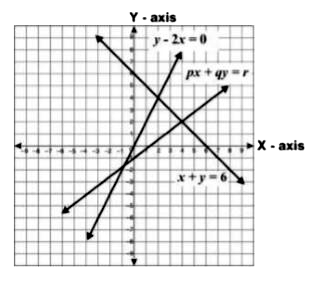Consider the set of all lines px+qy+r=0 such that 3p+2q+4r=0. Which one of the following statements is true ?
The lines are not concurrent
The lines are concurrent at the point (34,12).
The lines are all parallel
Each line passes through the origin
The correct Answer is:B
px+qy−(3p+2q4)=0⇒p(x−3/4)+q(y−1/2)=0
Hence lines pass through (3/4,1/2)
Similar Questions
Using the properties of determinats, prove that
∣∣ ∣ ∣ ∣ ∣∣(a+b)2ccca(b+c)2aabb(c+a)2b∣∣ ∣ ∣ ∣ ∣∣=2(a+b+c)3.
Or, If p≠0,q≠0and∣∣ ∣ ∣∣pqpα+qqrqα+rpα+qqα+r0∣∣ ∣ ∣∣=0 then using the propetries of eterminants, prove that at least one of the following statements is true:
(a) p,q,r are in GP (b) α is a root of the equation px2+2qx+r=0.View SolutionConsider the cubic equation x3+px2+qx+r=0, where p, q, r are real numbers, which of the following statement is correct?
View Solution
Knowledge Check
- Question 1 - Select One
Given that P+Q+R=0. Which of the following statement is true?
A|P|+|Q|=|R|B|P+Q|=|R|C|P|−|Q|+|R|D|P−Q|=|R| - Question 2 - Select One
If p, q are true and r is false statement then which of the following is true statement?
A(p∧q)∨ r is FB(p∧q)∧r is TC(p∨q)∧(p∨r) is TD(p∧q)∨(p∧r)is F - Question 3 - Select One
Consider the following statements in respect of the quadratic equation 4(x−p)(x−q)−r2=0 where p.q.r are real numbers
1. The roots are real
2. The roots are equal if p = q and r = 0 Which of the above statements is/are correct ?A1 onlyB2 onlyCBoth 1 and 2DNeither 1 nor 2
Consider a triangle PQR having sides of lengths p,q,r opposite to the angles P,Q,R respectively. Then which of the following statements is (are) true?
View SolutionConsider the given question and decide which of the following statements is sufficient to answer the question. What are the values of p, q and r? Statements: 1. (p+q)2=16 2. p−q=4,r=2p
View SolutionIf p, q are true and r is a false statement, then which of the following is a true statement?
View SolutionShown below are the graphs of the lines y−2x=0,x+y=6andpx+qy=r

Which of these is the solution for the pair of equations x+y=6 and px+qy=rView SolutionIf one root of the quadratic equation x2+px+q=0 is 2−√3 : where P,Q⊂Q.Then which of the following is true ?
View Solution
